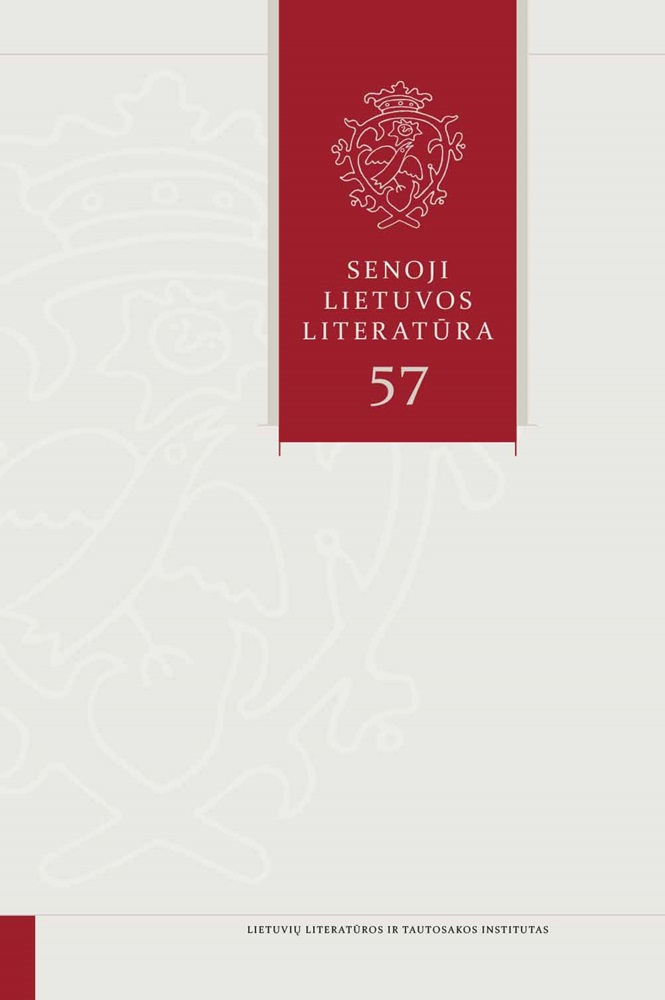From a ‘Ruthenian’ to a ‘Noble Lithuanian’: Shifts in the Sixteenth-Century Historical Narrative of the Grand Duchy of Lithuania
Abstract
The article discusses the shifts in the attitude towards the Orthodox believers and Ruthenians in the sixteenth-century historical and polemical writings and epistolary works of the Grand Duchy of Lithuania. It starts with an analysis of the conversion of pagan Lithuanian dukes to Orthodoxy as described in the chronicles of Lithuania, which is followed by a review of the letters of Chancellor Albertas Goštautas (Olbracht Gasztołd, †1539) and the struggle against the group of Hetman Konstantinas Ostrogiškis (Konstanty Ostrogski) that is reflected in those letters. The study concludes with an analysis of texts by Augustinus Rotundus, Maciej Stryjkowski, and other authors from the second half of the sixteenth century. In these texts, the representatives of the Ruthenian elite of the Grand Duchy of Lithuania – the Chodkevičius (Chodkiewicz), the Valavičius (Wołłowicz) – are already considered to be ‘noble Lithuanians’.

This work is licensed under a Creative Commons Attribution 4.0 International License.
Most read articles by the same author(s)
- Ona Aleknavičienė, Liucija Citavičiūtė, Mintautas Čiurinskas, Kęstutis Gudmantas, Raimonda Meyer-Ravaitytė, Simona Mocejūnaitė- Vaitkienė, Jūratė Pajėdienė, Kotryna Rekašiūtė, Žavinta Sidabraitė, Tadas Šaulys, Eleonora Terleckienė, Viktorija Vaitkevičiūtė Verbickienė, Chronicle , Senoji Lietuvos literatūra: Vol. 58 (2024): Senoji Lietuvos literatūra
- Kęstutis Gudmantas, Asta Vaškelienė, Živilė Nedzinskaitė, Annotations , Senoji Lietuvos literatūra: Vol. 38 (2014): Senoji Lietuvos literatūra
- Kęstutis Gudmantas, The Forgery of Magdeburg Rights for Veliuona (the Late Eighteenth Century): Its Copies, the History of the Text, and the Circumstances of Its Creation , Senoji Lietuvos literatūra: Vol. 56 (2023): Senoji Lietuvos literatūra
- Kęstutis Gudmantas, On the publication of the Patriarshy Manuscript (Sin 790) , Senoji Lietuvos literatūra: Vol. 48 (2019): Senoji Lietuvos literatūra
- Kęstutis Gudmantas, “Me Living with Him in Love According to This Letter...”: a Few Remarks about the New Edition of Lithuanian-Muscovite International Treaties , Senoji Lietuvos literatūra: Vol. 45 (2018): Senoji Lietuvos literatūra
- Kęstutis Gudmantas, The Tikhonravov Copy. Transcription , Senoji Lietuvos literatūra: Vol. 48 (2019): Senoji Lietuvos literatūra
- Kęstutis Gudmantas, The Tikhonravov Copy of the Lithuanian Chronicles: Investigation and Publication , Senoji Lietuvos literatūra: Vol. 48 (2019): Senoji Lietuvos literatūra
